
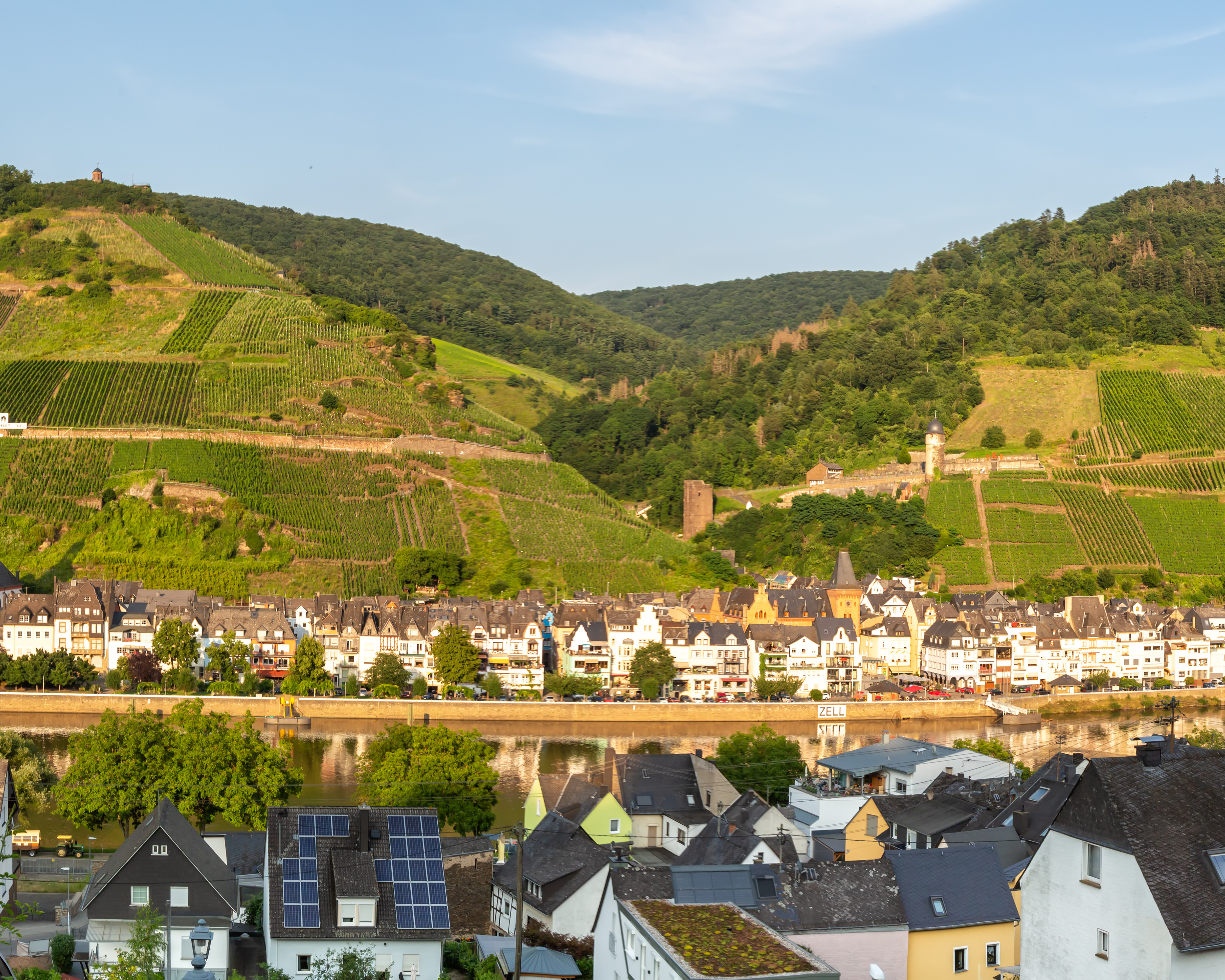
Mosel: Germany’s iconic wine region
From mineral-driven Rieslings to stunning terraced vineyards, discover the elegance and heritage of Germany’s most celebrated wine region.
Riesling from the Mosel is not just a wine, it’s a story of history and soil, an expression of the river and the land.
– German wine proverb
The Mosel: Germany’s timeless Riesling paradise
The Mosel is Germany's most renowned wine region, famed for its breathtaking landscapes and world-class Rieslings. With its steep, terraced vineyards stretching along the Mosel River, the region has been producing wines for over 2,000 years, influenced by the region’s unique microclimates, soils, and centuries of winemaking tradition. The Mosel’s wines are renowned for their minerality, fresh acidity, and delicate sweetness, with Riesling at the heart of the region’s winemaking.
Mosel Rieslings are some of the most sought-after wines in the world, prized for their ability to age gracefully while retaining their freshness and vibrant character. The cooler climate of the region, combined with its slate soils, imparts a distinct minerality and crispness to the wines, allowing them to express the terroir beautifully. From the gentle Upper Mosel to the steep slopes of the Middle and Lower Mosel, the region offers an impressive range of wines, each reflecting the unique influence of its terroir.

Explore the famous sub-regions of Mosel
Upper, Middle, and Lower Mosel: Unique expressions of Riesling
The Mosel is divided into three distinct sub-regions, each contributing its own style and character to the wines produced here. From the cool, river-adjacent Upper Mosel to the steep, sun-soaked terraces of the Lower Mosel, each sub-region produces wines that reflect the specific terroir and microclimate of its area. The three sub-regions include:
🍇 Upper Mosel (Obermosel) – The Upper Mosel is known for its cooler climate and is home to some of the region’s most refreshing white wines, including Elbling, a variety that thrives in this region. The wines here tend to be lighter, offering crisp acidity and delicate floral notes, with subtle mineral characteristics. While Riesling is still grown here, it’s often used to produce fresher, fruit-driven expressions of the grape, perfect for those looking for a lighter, more approachable wine.
🍇 Middle Mosel (Mittelmosel) – The heart of the Mosel wine region, the Middle Mosel is where some of the finest Rieslings are produced. Known for its steep, south-facing vineyards, the Middle Mosel benefits from ideal ripening conditions, allowing the Riesling grape to reach its full potential. The wines from this sub-region are often more concentrated, with vibrant acidity, rich fruit flavors, and the signature minerality that Mosel Rieslings are famous for. This is the place for those seeking the very best expressions of Riesling.
🍇 Lower Mosel (Terrassenmosel) – Known for its terraced vineyards, the Lower Mosel is home to some of the region’s most structured and full-bodied wines. The steep slopes along the river provide excellent sunlight exposure, allowing the grapes to develop a balance of richness and acidity. The wines here tend to have more body and complexity, with deep fruit flavors and a strong mineral backbone. These are the wines that have the potential to age for many years, evolving into more nuanced and intricate expressions over time.
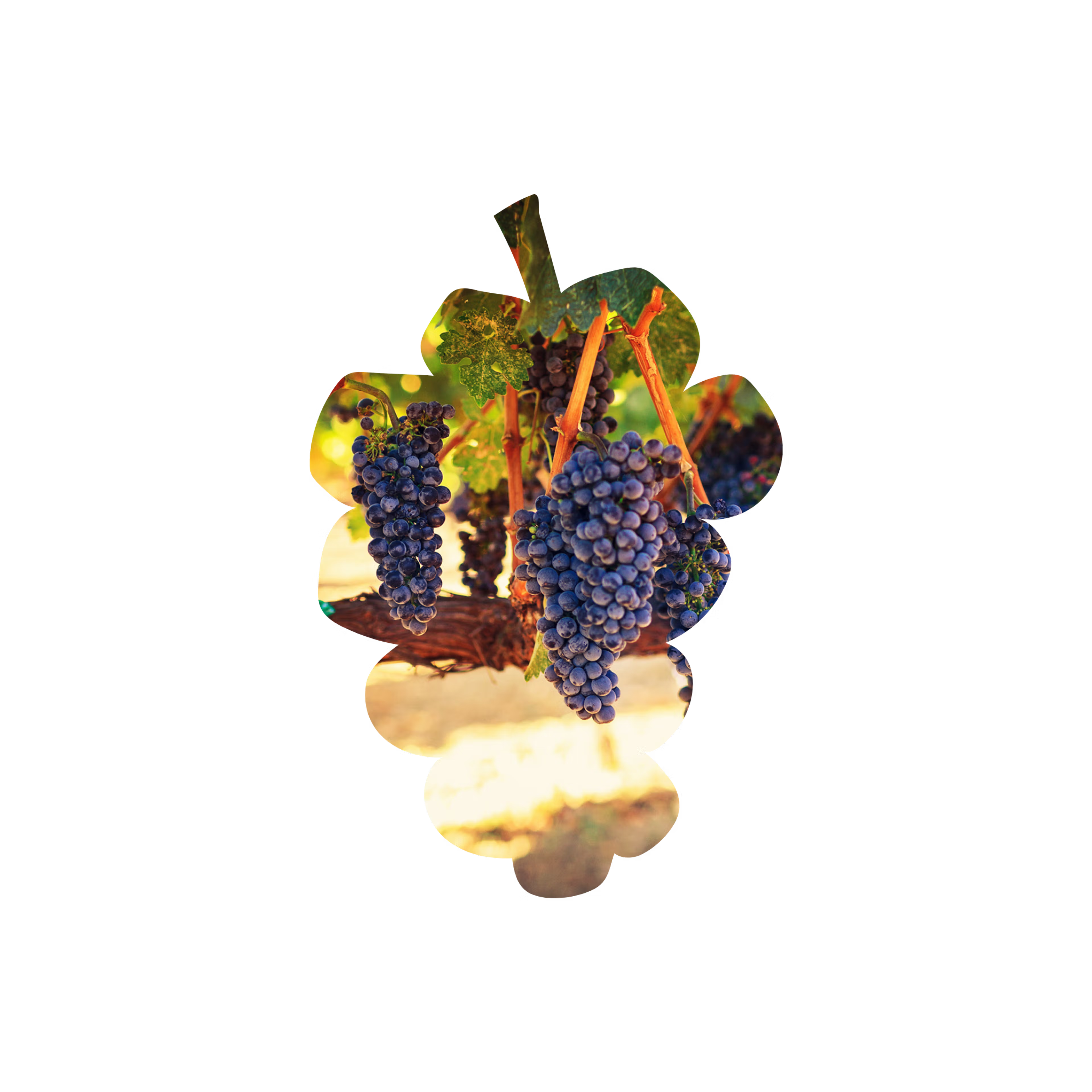
Riesling: The soul of Mosel’s wines
Riesling: The King of the Mosel
Riesling is undoubtedly the star of the Mosel wine region, and it has become synonymous with the region’s identity. This versatile grape flourishes in the cool, steep vineyards along the Mosel River, producing wines that range from bone-dry to lusciously sweet, all while maintaining a distinct minerality and vibrant acidity.
🍇 Riesling – Riesling from the Mosel is renowned for its balance between sweetness and acidity, and it is often described as the most expressive grape when it comes to showcasing the region’s terroir. The cool climate allows the grapes to ripen slowly, developing complex aromas and flavors while retaining a crisp acidity. Mosel Rieslings can be bone-dry, off-dry, or lusciously sweet, and each style reveals different aspects of the grape. Whether young and vibrant or aged and complex, Mosel Rieslings have a unique ability to showcase the pure essence of the region’s soils, especially the slate that is so prevalent in the area.
Riesling from the Mosel offers aromas of citrus, stone fruits, and floral notes, with a characteristic minerality that is both refreshing and intriguing. These wines often have the ability to age gracefully, with the best examples evolving into more complex and nuanced expressions as they mature.
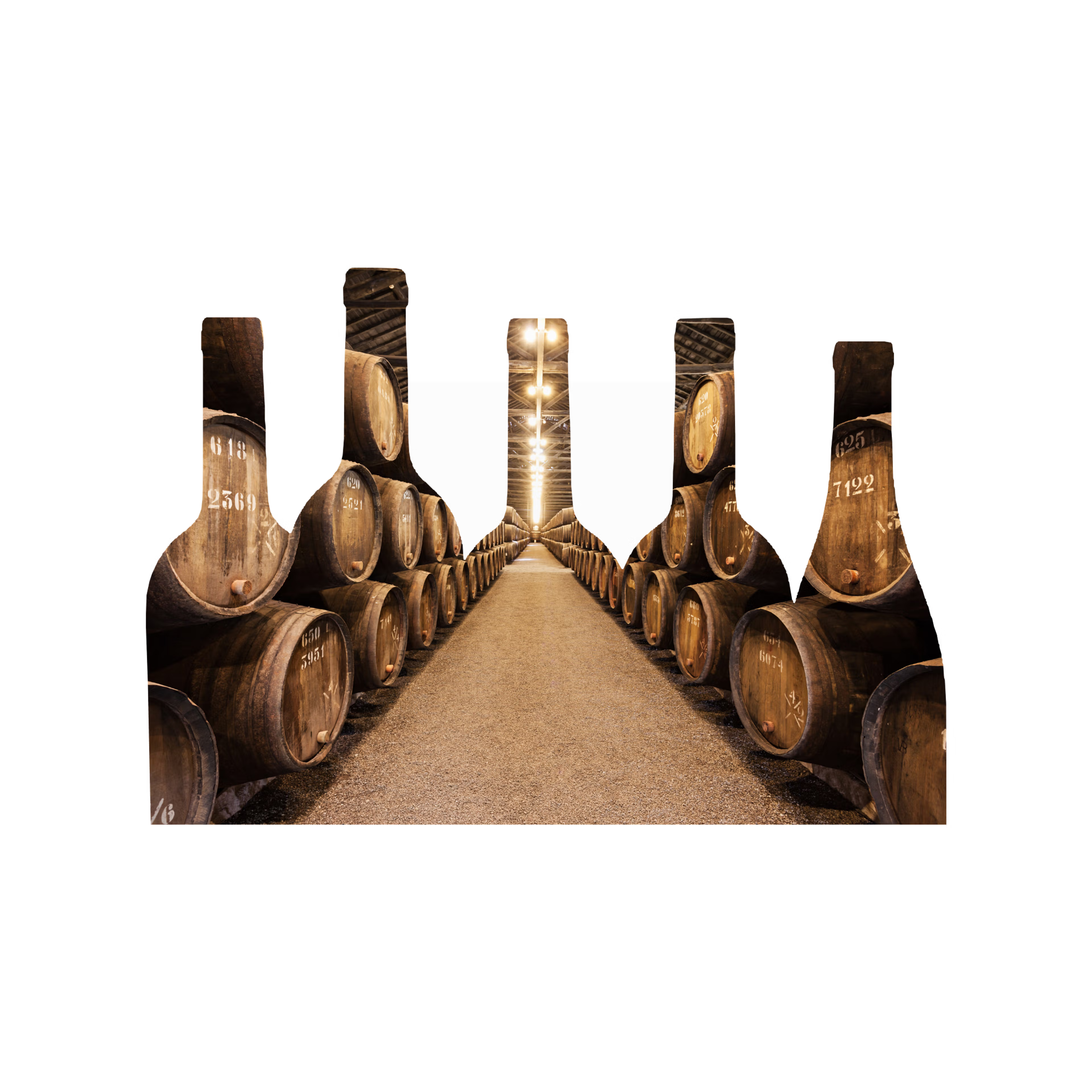
Discover the iconic producers of Mosel
Joh. Jos. Prüm, Egon Müller, Markus Molitor, Dr. Loosen: The legends of Mosel
The Mosel region is home to some of the most prestigious and renowned wine producers in the world. These producers have helped shape the reputation of the region, crafting exceptional Rieslings that showcase the true essence of Mosel’s terroir. From the legendary estates to the more modern, innovative producers, Mosel wines are a reflection of both history and contemporary winemaking excellence.
🍇 Joh. Jos. Prüm – One of the most iconic names in the Mosel, Joh. Jos. Prüm has been crafting world-class Riesling for over a century. The estate is known for producing wines with incredible balance, vibrant acidity, and a remarkable ability to age. Their Rieslings are elegant and complex, with floral, citrus, and stone fruit aromas, complemented by a distinctive minerality. Joh. Jos. Prüm is particularly known for its high-quality wines from the Middle Mosel, producing some of the best expressions of Riesling in the world.
🍇 Egon Müller – Widely regarded as one of the top producers in the world, Egon Müller is famous for producing some of the finest sweet Rieslings on the planet. The estate is particularly renowned for its wines from the Scharzhofberg, one of the most prestigious vineyards in the region. Egon Müller’s wines are known for their exceptional purity, precision, and ability to age for decades. With delicate sweetness, vibrant acidity, and a clear mineral profile, these wines are a true expression of Mosel’s unique terroir.
🍇 Markus Molitor – A modern producer with a deep respect for tradition, Markus Molitor is one of the leading figures in the Mosel today. His estate focuses on producing Rieslings that are rich, complex, and full of character. With an emphasis on vineyard-specific wines and meticulous attention to detail, Markus Molitor’s wines are celebrated for their balance of fruit intensity, acidity, and minerality. His wines range from dry to sweet, showcasing the versatility of the Riesling grape and the diverse terroirs of the Mosel.
🍇 Dr. Loosen – One of the most famous names in the Mosel, Dr. Loosen is known for producing wines that highlight the true character of the Riesling grape. Led by the passionate winemaker Ernst Loosen, the estate focuses on creating wines that are pure, expressive, and full of life. The wines from Dr. Loosen are characterized by their vibrant acidity, rich fruit flavors, and a beautiful balance of sweetness and minerality. With an emphasis on sustainable viticulture and a focus on classic Mosel terroirs, Dr. Loosen has earned its place as one of the top producers in the world.
Explore the legendary vintages of Mosel
Madeira is known for producing some of the world’s most age-worthy wines, with many bottles capable of lasting for decades, even centuries. Certain vintages have become legendary for their quality and longevity, representing the pinnacle of Madeira’s winemaking tradition. These remarkable years showcase the power of Madeira’s fortification process and its ability to age gracefully over time.
📅 1900 – A Century of Excellence
• The 1900 vintage is one of the most sought-after Madeira vintages, with bottles from this year still being enjoyed today. Known for its rich, complex flavors and incredible longevity, the 1900 Madeira is a true testament to the aging potential of the island’s wines. The wines from this year exhibit deep, nutty flavors, with notes of dried fruit, caramel, and a touch of spice, making it an exceptional example of Madeira’s timeless appeal.
• Notable wines: Blandy’s 1900 Malmsey, D’Oliveira 1900 Bual.
📅 1920 – A Vintage for the Ages
• The 1920 vintage is another historic year in Madeira’s winemaking history, producing wines with remarkable depth and complexity. These wines are known for their intense flavors, rich texture, and smooth finish, with hints of dark fruit, chocolate, and a subtle earthiness. The 1920 vintage continues to age beautifully, offering an exceptional tasting experience for those lucky enough to sample it.
• Notable wines: Henriques & Henriques 1920 Verdelho, Barbeito 1920 Sercial.
📅 1954 – A Classic Madeira Vintage
• The 1954 vintage is widely regarded as one of the best of the 20th century, known for its balanced acidity and rich, nutty character. Wines from this vintage have stood the test of time, offering complex aromas of dried fruits, toasted nuts, and honeyed sweetness. The 1954 Madeira is a favorite among collectors for its consistency and remarkable aging potential.
• Notable wines: Blandy’s 1954 Bual, Henriques & Henriques 1954 Malmsey.
📅 1996 – A Modern Classic
• The 1996 vintage represents a more recent classic, showcasing the continued excellence of Madeira winemaking. These wines are fresh and vibrant, with bright acidity and rich, layered flavors of citrus, nuts, and caramel. The 1996 vintage is already being enjoyed for its balance and drinkability, while also possessing the aging potential to develop further complexity over the next few decades.
• Notable wines: Barbeito 1996 Sercial, D’Oliveira 1996 Malmsey.
Store your Mosel wines at the perfect temperature
Explore our wine coolers →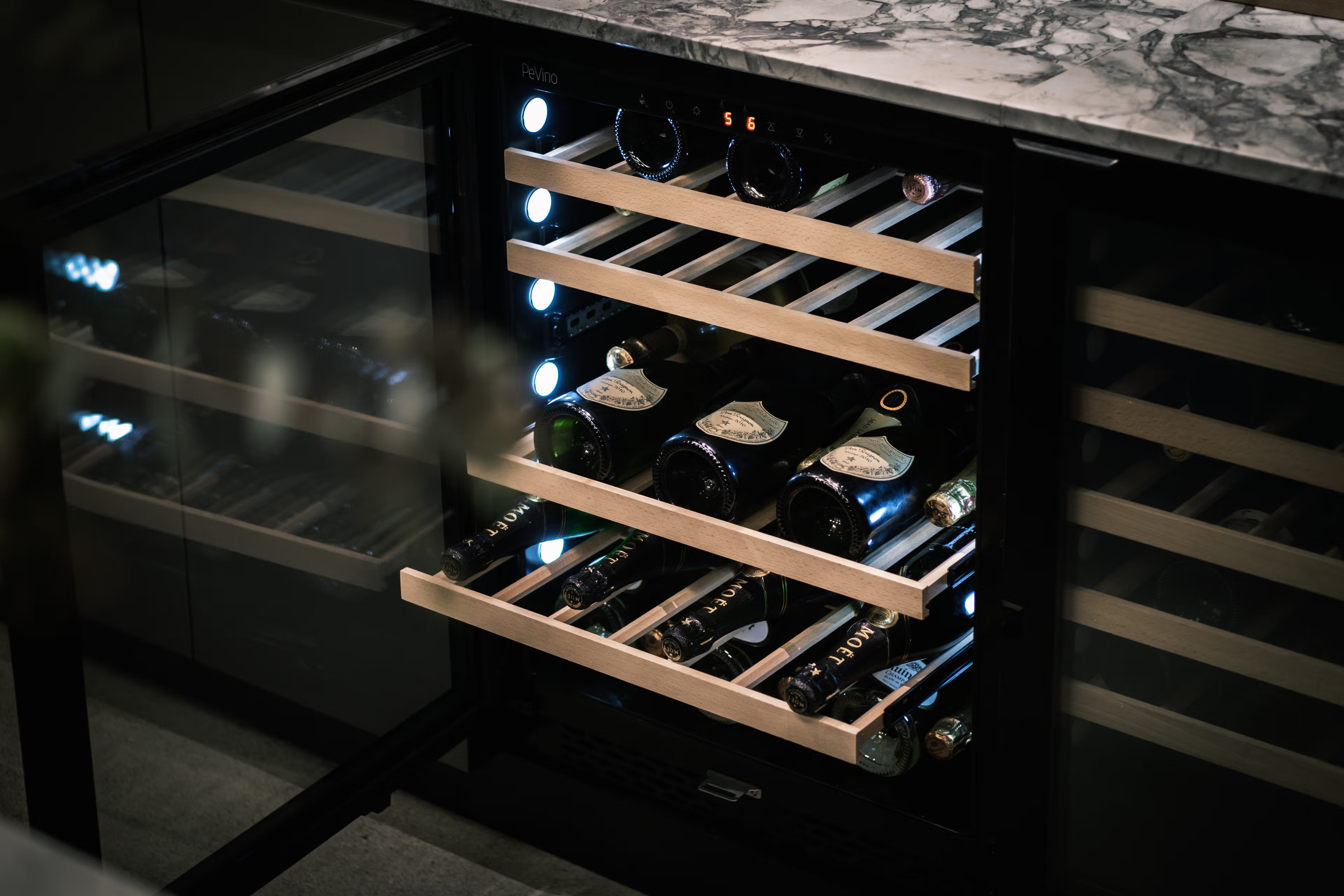
Showcase your Mosel wine collection with style
Find your ideal wine rack here →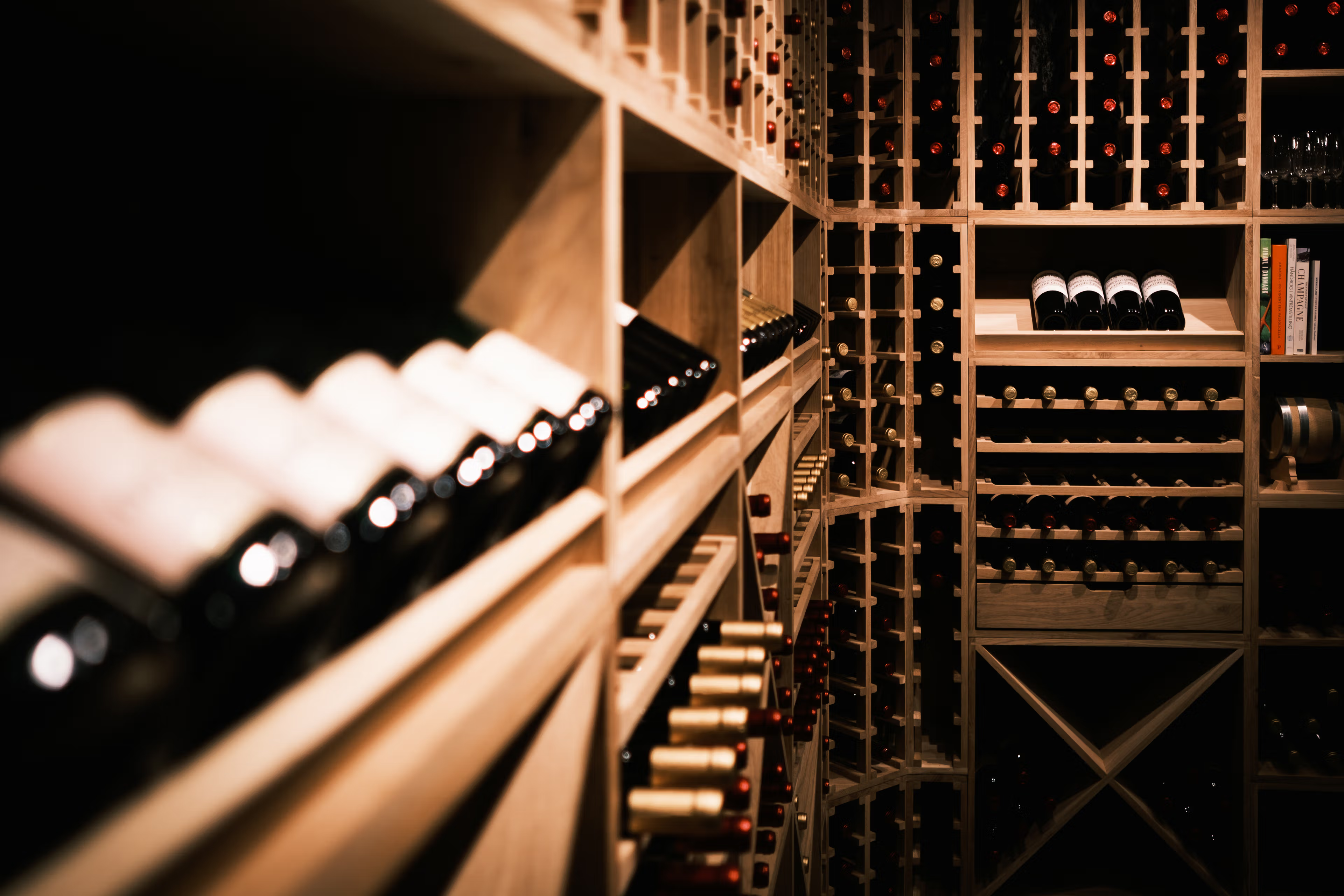
Mosel: Germany’s Premier Riesling Region
The Mosel is one of the most iconic wine regions in the world, renowned for its Rieslings that combine elegance, freshness, and remarkable minerality. The region’s history of winemaking stretches back over two millennia, and it continues to be a leader in the production of high-quality wines. The Riesling grape flourishes in the cool climate and steep vineyards of the Mosel, producing wines that are both refreshing and complex, with the ability to age beautifully.
The unique terroir of the Mosel is shaped by its steep slopes, which provide excellent sunlight exposure for the vineyards, and its proximity to the Mosel River, which helps to moderate temperatures. The combination of these factors allows the Riesling grape to ripen slowly, developing a perfect balance between sweetness and acidity. Additionally, the slate soils of the region contribute to the distinct minerality that is characteristic of Mosel wines, allowing them to showcase the pure expression of the terroir.
The Importance of Terroir in Mosel Winemaking
The terroir of the Mosel is unlike any other wine region in the world. The steep vineyards that stretch along the Mosel River are planted in a variety of soils, from slate to quartzite, each influencing the flavor profile of the wines. Slate soils, in particular, are known for their ability to retain heat during the day and release it at night, creating ideal conditions for the Riesling grape to ripen slowly and evenly.
The Mosel is divided into three main sub-regions – the Upper, Middle, and Lower Mosel – each with its own unique climate and terroir. The Upper Mosel is cooler, producing light, crisp whites, while the Middle Mosel is home to some of the best Riesling vineyards, where the wines are more concentrated and complex. The Lower Mosel, with its steep terraces, produces more structured wines with deep fruit flavors and rich minerality.
The Art of Riesling Winemaking in Mosel
Making wine in the Mosel requires a deep understanding of both the land and the grape. Riesling is the most important grape variety in the region, and it is known for its versatility. Riesling can be made in a wide range of styles, from bone-dry to lusciously sweet, but all Mosel Rieslings share a common thread – the delicate balance between fruit, acidity, and minerality.
The winemaking process in Mosel often involves traditional techniques, including hand-harvesting and careful fermentation. Many producers in the region rely on spontaneous fermentation, allowing the natural yeasts to work, which enhances the expression of the terroir. Mosel winemakers are also known for their focus on preserving the freshness and vibrancy of the grape, ensuring that the wines retain their characteristic liveliness and acidity.
The Versatility of Mosel Riesling
Mosel Riesling is incredibly versatile and can be enjoyed in a variety of settings. The dry styles are perfect for seafood and light poultry dishes, while the sweeter styles pair beautifully with spicy Asian cuisine or rich desserts. The region's Rieslings are also known for their exceptional aging potential, with some of the best wines improving over decades, developing more complex and nuanced flavors as they mature.
The diversity of Mosel Riesling is one of the reasons why it is so highly regarded around the world. Whether you are looking for a fresh, crisp wine to enjoy on a warm day or a rich, complex wine to cellar for years, Mosel has something to offer for every occasion.